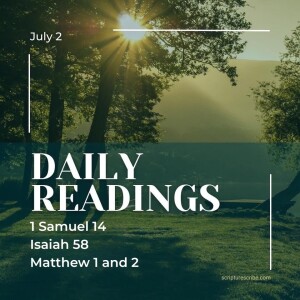
Wednesday Jul 02, 2025
Thoughts on the Bible Readings (1 Samuel 14, Isaiah 58, Matthew 1, 2) for July 2nd
In 1 Samuel 14 Jonathan and his armour bearer, in response to a God given sign, show immense courage by together discovering themselves to a Philistine fortress at Michmash and defeating it. The first strike of the two faithful Hebrew warriors was to destroy 20 of the foe inducing panic within the garrison- the great trembling referred to is a translation of the words meaning ‘a trembling from God’. The ensuing chaos turns soldier against soldier. Saul seizes the moment and, after foolishly uttering a self-centred oath, commands to immediately attack. Although Saul is victorious Yahweh would not answer him. Saul compounds his folly with yet another disgraceful response. The people are forced to unitedly negate Saul’s oath and save Jonathan from death. The chapter concludes with Saul and his valiant sons subduing many national enemies.
Isaiah, in chapter 58, outlines a nation which gave lip service to God but not from their hearts. The early verses of this chapter focus on fasting. Fasting can be of value in concentration of the mind on God. But it is of no value when those who observe it ritually forsake the principles of the Almighty. They spoke of the Sabbath and yet failed to comprehend what their Sovereign was teaching them – it was a day of support and burden lifting from those oppressed; a day of joy and not of self-affliction. If Israel embraced God’s values and practiced them then Yahweh would liberate them and cause them in their minds spiritually to soar into the heavenlies. Then their minds would harmonise with their Sovereign.
The New Testament opens by highlighting the promised seed, this is Jesus, central to the monumental Covenants around which much of the Old Testament is structured. Matthew 1 is the genealogy of Mary the mother of our Lord Jesus Christ through king David. Luke’s account of the genealogies of our Lord Jesus Christ in Luke 3 verses 23-38 is Joseph’s (Jesus’ stepfather’s)) lineage. Jesus’ ancestral line through his mother Mary – note Luke’s differs in that it gives Solomon as the progenitor of this line – who descended from David’s son Nathan. The story of Matthew 1 links Mary with four other stigmatised women (Tamar, Rahab, Ruth and Bathsheba), who, despite their public shame were, like Mary, outstanding women of faith. These women despite being stigmatised like Mary carried their scorn in their age just as our Lord Jesus Christ was accused of being born of doubtful legitimacy throughout his life. Jesus came into existence at the time of his birth. Prior to that time he had no existence; except that His Almighty Father had structured the whole creation around the coming of His Son. The name Jesus means “the salvation of Yahweh”, as Matthew 1verse 23 tells.
Matthew 2 describes the visit of the Magi and their costly gifts for the King of the Jews – a title that the Idumean Herod arrogated to himself – allowing us to date the birth of the Lord Jesus Christ to 6BC. Joseph, Mary and Jesus fled to Egypt in the fulfilment of prophecy (Hosea 11:1). The precious gifts of the wise men allowed Messiah’s family to subsist in Egypt until it was time to return to their place of residence in Nazareth upon the accession of Archelaus following the death of Herod the Great in 4BC.
No comments yet. Be the first to say something!